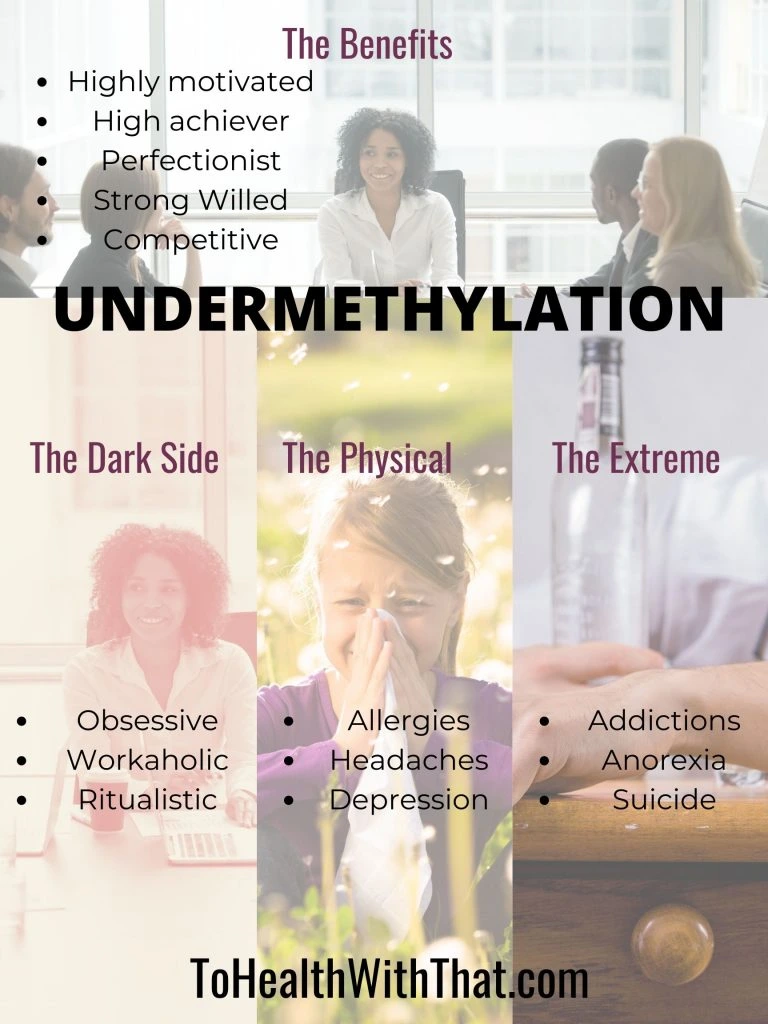Undermethylation, as we have discussed, is the most common state according to the research of Dr. Carl Pfeiffer in his book Nutrition and Mental Illness, An Orthomolecular Approach To Balancing Body Chemistry. Undermethylation really isn’t one state – it’s a tendency based on your genes, lifestyle, stressors, diet, and environment. Undermethylation is also a tendency that flows in a spectrum, from very mild symptoms to far more severe ones.
If you’re not sure if you’re an undermethylator, methylation neutral, or an overmethylator then visit this post for a comparative chart. As with everything else, even the most severely undermethylated person will have some associated traits and not others – this is all very individual. The biggest constants are high achievement/perfectionism, seasonal allergies, and depression.

Undermethylators Are Blessed With Many Positive Traits.
- High motivation
- High drive to achieve
- Perfectionist
- Competitive
- Strong-willed
There Can Be A Darker Side:
- Obsessive-compulsive traits or disorder
- Anorexia
- Workaholism
- Other addictions
- Ritualistic behavior

Undermethylation Can Lead to Physical or Medical Issues
- Seasonal and inhalant allergies – this picture is dominated by high histamine and this is one of the most common problems even in relatively moderate or healthy undermethylation.
- Headaches – these could be hormonal, allergic, stress-related, or migraine.
- High HIstamine
- Ulcers
- Addictions – softer addictions like workaholism in more healthy situations, which can progress to harder addictions.
- Depression – depression is very common in this group and it can be quite severe.
At The Extreme End of Pathology Undermethylators Can Be Prone To:
- Paranoia, delusions, or phobias – the FBI or CIA is after them, their neighbor is an alien, etc….
- Denial of or tendency to hide illness – illness just doesn’t go with perfection very well.
- Hearing voices – Dr. Pfeiffer estimated this to be 5-10% of this group.
- Major Depression
- Suicidal Tendencies
Nutritional Tendencies In Undermethylation
- Bad Reactions to B Vitamins – not every undermethylator experiences this, but many do. B vitamins, especially folate and B12, can cause bad reactions.
- Often low calcium and/or magnesium
- Often low methionine
- Often low B6
- Often low serotonin – can be extremely low
- Often low melatonin – made from serotonin, so tracks along with it.
Medication and Supplement Reactions in Undermethylation

This represents what is typical for the group, but drug and nutrient reactions can be very personal, so this is a general guideline and not a certainty. This information is both from Dr. Pfeiffer’s book (see above), this article, and my own experience with clients.
| Typically Good Reaction | Typically Bad Reaction |
|---|---|
| SSRI medications (although may still be troubled by side effects) | Benzodiazepines |
| Antihistamines | Folic Acid, Folate, Folinic Acid, 5-LMTHF |
| Methionine | Choline |
| SAMe, DMG or TMG (all methyl donors) | Histidine |
| St John’s Wort, melatonin | DMAE |
| Calcium and magnesium (1:1 ratio), zinc | Copper |
| Antioxidants – A, C, E, alpha-lipoic acid, resveratrol, ECGC, etc… | High folate foods including dark green leafy veggies and beans/pulses |
| Inositol | |
| B6 | |
| Omega-3 fatty acids |
Finding your best path forward is still a bit of trial and error, but this can give you some starting points. Remember, all of this depends not only on your MTHFR polymorphism, but all the other polymorphisms you might have (of which there are likely hundreds if not thousands) so be patient with yourself when you’re finding the best nutrients for your body.
MTHFR is a common genetic mutation that can contribute to anxiety, depression, fatigue, chronic pain, infertility, and more serious conditions like breast implant illness, heart attack, stroke, chronic fatigue syndrome, and some types of cancer. If you know or suspect you have an MTHFR variant, schedule a free 15-minute meet-and-greet appointment with MTHFR expert Dr. Amy today.
Book Your Appointment
